| |
|
|
| |
Phew !
Sat 2nd February, 2013
|
|
|
|
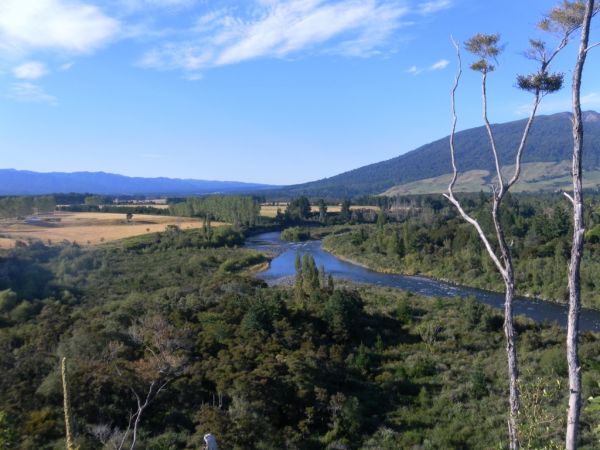 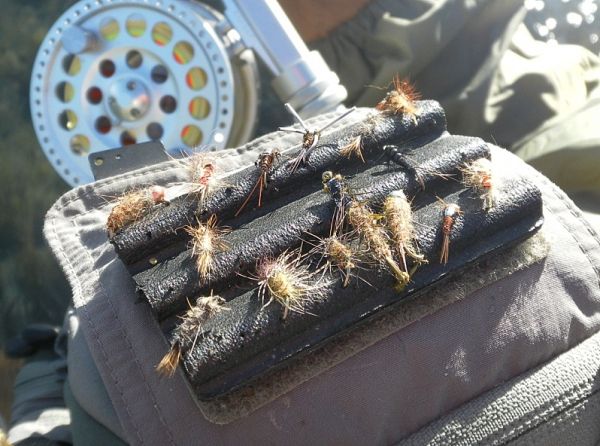
Another fabulous spell of summer weather in Turangi. It may not have provided ideal fishing conditions but I'm not complaining. I really don't mind standing in a cool river on a warm sunny day. Looking at my notes for the week reminded me that although the day-time temperatures were sometimes in the thirties, if you were on the river at dawn {with no jacket}
it was pretty cold. With the low clear conditions and hot afternoons an early start usually paid off. But I found the fishing a little more challenging this week calling for lighter tippets and a variety of small naturals. There were more browns around and these were easily spotted in places like Admirals or Duchess. Unfortunately they weren't interested in any of my flies. But take a look at the fish below. 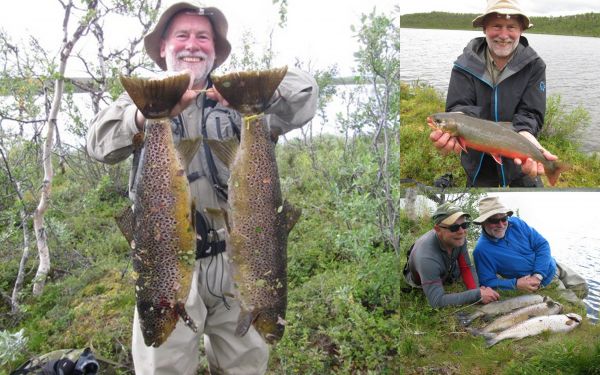
You may recognize Norwegian angler Tore Aalberg. I fished with Tore on the Tongariro a couple of years ago and he seems to make a habit of catching good browns because he had a fish over nine pounds then. These are from one of the rivers on his own patch in Norway. Yet another example of how highly overseas anglers regard the Tongariro. Despite having fish like this on his doorstep he's prepared to travel halfway around the world to fish the Tongariro. This will be his third trip in three years because he's back again in a couple of weeks.
With no rain for sometime and the river flowing at its summer level of twenty two cumecs the algae growth covering the rocks is making things very slippery. If you were one of the anglers fishing opposite me in Boulder Reach earlier in the week I've no doubt you found it amusing when I did my arse first triple salko in the tail of the pool. I know I'd have laughed ... it was bloody funny.
While your smiling here's a few more of Grant's Irish jokes.
Paddy finds a sandwich with two wires stickin out of it. He phones the police and says "Bejesas I've just found a sandwich dat looks like a bomb."
The operator asks, "is it tickin?, Paddy says "No, I tink it's beef"
The Irish have solved their own fuel problems. They imported 50 million tonnes of sand from the Arabs and they're going to drill for their own oil.
Joe says to Paddy: "Close your curtains the next time you're making love to your wife. The whole street was watching and laughing at you yesterday."
Paddy says: "Well, the joke's on them, Stupid, because I wasn't even at home yesterday."
Anyway that dunking got me thinking so read on.
WADING TIPS FOR US OLDER ANGLERS
The Tongariro has plenty of excellent access and although you don't have to stand up to your armpits in the middle of the river to catch fish there are occasions when we have to wade.
The "young guns" on the river often extract the urine out of us old fellas especially where wading is concerned. But that clock starts ticking as soon as we take our first breath and its a fact none of us get younger. Sooner or later those situations that we didn't think twice about a few years ago suddenly become a little more tricky. Below are some things we can do to stay safe and dry.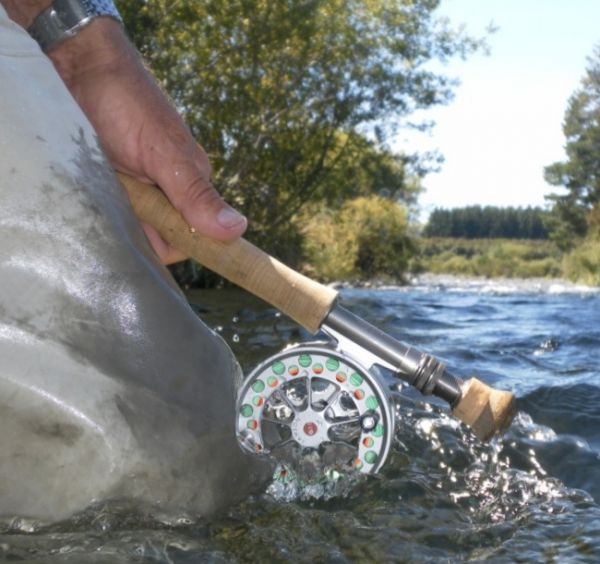
WEAR A BELT
A wading belt is one of the simplest things you can use to help keep you safe while negotiating your way around a river. It traps air inside your waders and contrary to the popular urban myth, if you fall in, you won't up end and drown. When was the last time you saw a pair of upside down wading boots float past with a hapless angler hanging underneath? More importantly it helps keep the river out if you take an unexpected dip. Try standing up, even in the shallows, with your waders full of water.
AVOID UNNECESSARY WADING
Fish your feet first and then enter the water if you have too. There's less chance of spooking fish if you stay out of the river, especially in deep, clear, slow moving pools.
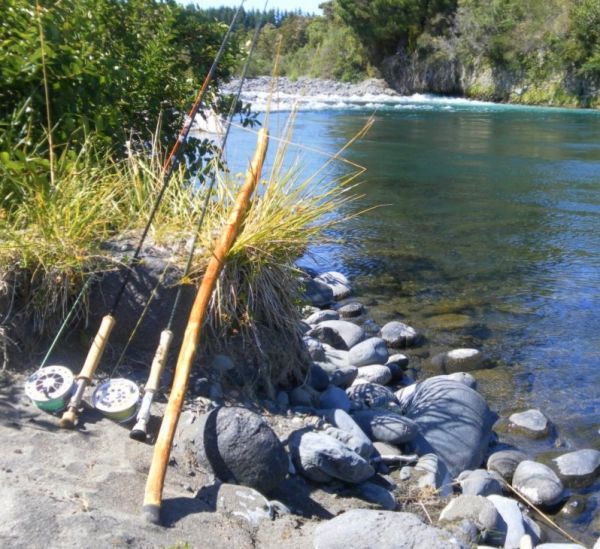
USE A WADING STICK
Nowadays I always carry a good stout wading stick. Even if your not wading and just walking, the Tongariro has areas along the rivers edge covered with large rocks and boulders. The extra stability a stick provides far outweighs the inconvenience of having to carry it. Some of mine are quite intricately decorated and I'm always asked where I get them. I have to make a confession here ... they're not carved by an old Maori craftsman ... he's actually a mate of a mate originally from Liverpool !
WEAR POLAROIDS
Eliminating glare ensuring you can see any obstacles below the surface will help you wade safely. Avoid crossing where you can't see the bottom.
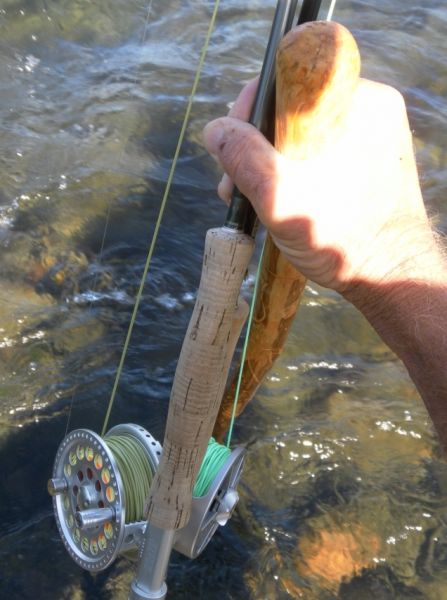
PLAN YOUR ROUTE
Study whats in front of you before you start and workout the safest way across. Check downstream for hazards or particularly fast or turbulent water. If you can't see a safe way out {should you get swept downriver} then it might be wiser to cross elsewhere.
WORK WITH THE RIVER NOT AGAINST IT
Where ever possible cross diagonally at a downstream angle.
BODY POSITION
Cross with most of your body side on to the current and your stick upstream. By leaning into the current using the stick for support you'll expose less of your body to the flow, making it easier to keep your balance as you make your way across.
THE POINT OF NO RETURN
We're all different but in deeper water there eventually comes a time when we become buoyant. To avoid a dunking learn to recognize your point of no return ... before its too late.
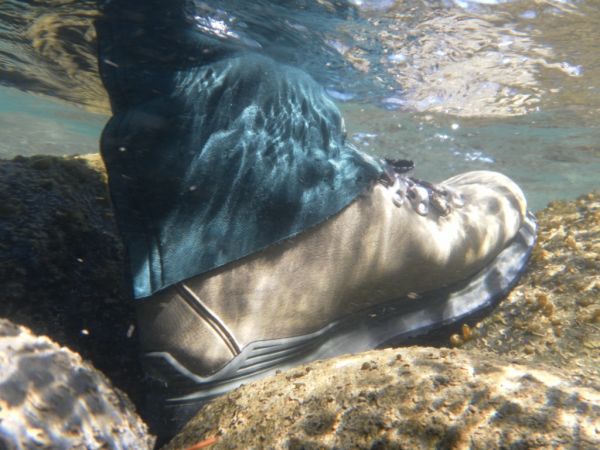
FEEL WITH YOUR FEET
The river bed of the Tongariro is often uneven and covered with smooth slippery rocks of all shapes and sizes. Use your stick to check for changes in depth and with a wide stance feel your way across with your feet. Some of the rocks will roll underfoot so always make sure you have one foot firmly planted before you transfer weight to take the next step.
WALK BACKWARDS
If you have to retreat its usually safer to edge backwards. Take your time until you get out of the main flow and into shallower water before you attempt to turn around.
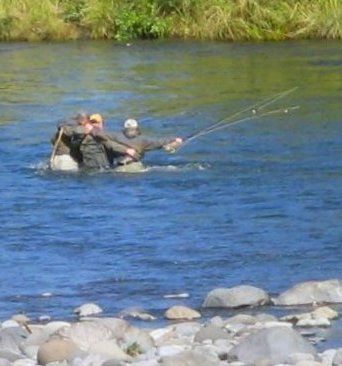
BUDDY UP
Where possible cross with another angler or anglers. By linking arms or holding on to one anothers wading belts its much safer and easier for two or three to cross together than a single person. Position the biggest or more confident angler upstream to break the flow for the others.
IF YOU DO FALL IN
Try not to panic. Roll onto your back with your toes out of the water and your feet pointing downstream. Concentrate on saving yourself not your tackle. If you have too, let the rods go and use both arms to help maintain this position as your carried downstream. Try and keep your feet pointing at any obstacles to protect your head and use your arms like oars to steer around them. Look for slower or shallower water ahead and if its safe to do so point your feet at an angle towards the bank and using your arms " row " ashore and get out of those wet clothes.
There's a recreational release from the Poutu Intake on Saturday 2nd February for six hours between 9.00 am and 3.00 pm. Then again on Sunday 3rd February from the Rangipo Dam for 8 hours between 8.00 am and 4.00 pm. Only Saturdays release from the Poutu Intake will have any effect on the lower Tongariro. The release on Sunday will only affect the stretch between the Rangipo Dam and the Poutu Intake. I've timed it in the past and it usually takes between one to two hours before you notice it around town. Although the fishing tends to improve either side of a release once the flow increases fish don't like this dirty water and whatever else comes down with it. Just as they do in a "natural" fresh they move out of the main flow and seek shelter in the margins. Some good browns can be had targeting the edges during these releases and the man made fresh usually encourages some "new" fish into the river.
A little bit of rain is forecast for Monday and Tuesday with cooler temperatures than of late. During the day I've taken a few small juveniles on dries in the riffles but most of my fish came fishing the nymph, often without an indicator. Another week has passed and there's still no sign of any real interest in cicadas...but keep trying.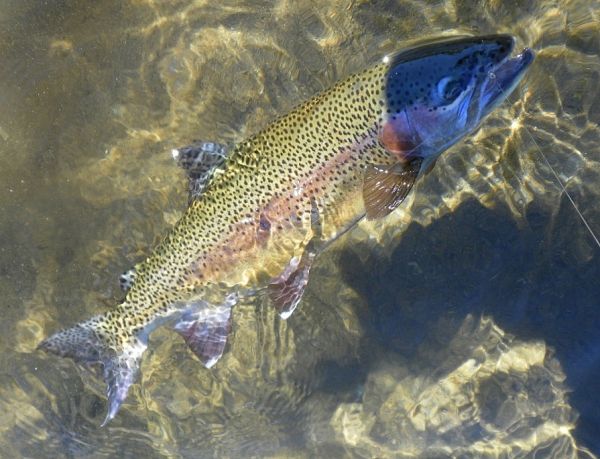
Tight lines guys
Mike. |
|
|
| Back to Top |
|
|
|
|
| |
| COMMENTS |
|
| Good advice as always, Mike! |
|
|
|
| Jon Novoselac | Fri 8th February, 2013 | |
|
|
|
| |
|
|
|